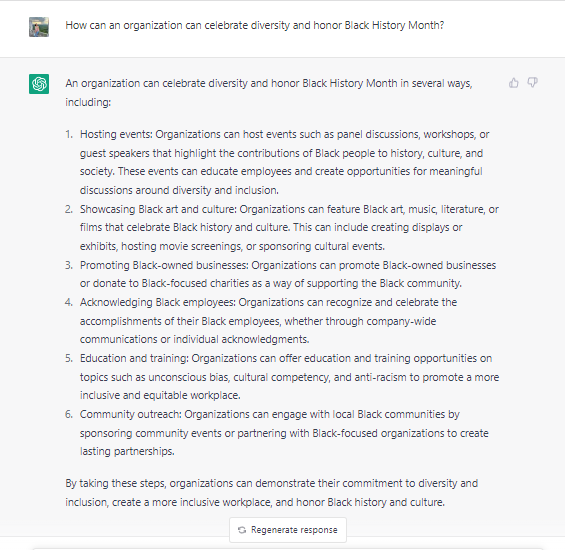Each February, the world takes the time to recognize and celebrate the contributions and accomplishments of Black individuals throughout history. This month is an opportunity to honor the resilience, creativity, and strength of Black communities, and to acknowledge the ongoing struggle for justice and equality. As we reflect on the legacy of Black individuals in our society, it is important to recognize their impact in every area of life. From arts and culture to science and technology, Black individuals have made significant contributions to our world, often in the face of great adversity.

Samuel Okoye, ML Engineer, Quantiphi, US
“Racism could be difficult to understand until you fully experience it. My past experiences taught me that I might face unfavorable situations, answer objectionable questions or deal with the fact that someone could perceive me as a threat even when I am not. So when I say Black Lives Matter, I don't mean other lives don't matter. I mean the house of a black man is on fire and that fire needs to be put out.”
In the current climate, the theme for the 2023 Black History Month, “Black Resistance” explores how “African-Americans have resisted historic and ongoing oppression, in all forms, especially the racial terrorism of lynching, racial pogroms, and police brutality.” By resisting, African-Americans are shaping social movements to create space for them to thrive. It is of particular significance in the wake of the horrors committed against the African-American community, especially by law enforcement. The Black Lives Matter movement highlighted the urgent need for systemic change to address racial injustice in all forms. The tech industry is no exception.
Black Indigenous People of Color in Tech
Though the tech industry has revolutionized the world, it is still plagued by a lack of diversity. Primarily populated by white, male employees, the underrepresentation of Black Indigenous People of Color (BIPOC) in tech remains a significant challenge. Despite their contribution to the tech industry's growth since its inception, systemic barriers and discrimination have challenged the accessibility and advancement of people of color within the industry. The lack of diversity not only impacts the industry's ability to innovate and create products that are inclusive but also perpetuates a culture that can be hostile towards those that do not fit the traditional mold.
In this context, it is crucial to understand the challenges faced by people of color in the tech industry and take steps to promote diversity and inclusion in the field. Microaggressions, lack of representation, bias, discrimination, and lack of access to education and training are some of the challenges that people of color face regularly. Several efforts to increase diversity and inclusion in the tech industry have been made, it is important for the tech industry to continue to prioritize diversity and inclusion efforts in order to create a more equitable and representative workplace.

Sydney Renee Reed, Dialog Designer, Quantiphi, US
“When I thought about engineers, I related them with men and hence thought I would never have room for myself on that table. But when I finally entered tech, I did see a lot of women. Though I was the only black woman in every team I worked with, so being one is a history in itself since only 1.7% of women in tech are black. Being a black woman in tech has empowered me with flexibility, stability and a diverse community to grow with.”
The environment becomes a lot more challenging for women of color in tech, as they are subjected to both racial and gender-based discrimination. Women, in general, are underrepresented in leadership roles, while women of color also experience unconscious biases in the workplace and cultural barriers that can make it difficult to navigate the predominantly white, male-dominated industry. Women of color often feel isolated and feel they do not fit into the workplace culture. There are several ways these challenges can be overcome, the most promising solution, however, is Artificial Intelligence.
The role of AI in addressing challenges faced by people of color
Artificial intelligence (AI) could potentially help overcome challenges faced by people of color. By utilizing AI, biases in decision-making algorithms can be identified and addressed, thereby increasing access to opportunities and ensuring equitable access to opportunities and resources. It can also assist in monitoring and identifying instances of discrimination and bias in various sectors, facilitating more effective policing and social justice reforms. In essence, by reducing human interference in decision-making processes, AI algorithms can ensure decisions are based on objective data and analysis.
AI is a powerful tool to reduce racial biases against people of color, it is essential to understand that it is not a silver bullet and can also exacerbate existing biases. AI is only as unbiased as the data and algorithms it is based on. If these inputs are biased, the outputs will also be biased. Care must be taken to ensure that data and algorithms used in AI are free from bias and are transparent and accountable. It is also essential to recognize that AI does not replace human judgment and decision-making. Human oversight and accountability are essential to ensure that AI is used in a responsible and ethical manner. This means it is crucial to involve diverse perspectives in the development and deployment of AI systems in organizations.
Honoring Black History Month and Supporting People of Color in an Organization
People of color are often underrepresented in the tech industry, particularly in leadership positions. Ensuring that diversity is maintained at all levels and that the workplace is inclusive requires a multifaceted approach that addresses biases in data, algorithms, and decision-making processes. Considering AI's recent creation, ChatGPT, we thought it would be a good idea to ask AI about how an organization can celebrate diversity and honor Black History Month. Here is what it had to say -

We, at Quantiphi, recognize the ongoing work that needs to be done to create a more equitable society, and we are committed to doing our part to effect positive change. This month, we take this opportunity to acknowledge the experiences of fellow Quantiphites in the US and Canada.
Amplifying the Voices of Those Who Matter
The experiences of people of color across the world are varied, including in America, Canada, and Europe. Since each country has its own unique history and social dynamics, there are key differences in how discrimination against African people manifests in different regions. With a unique history of colonialism and current social dynamics, experience as a person of African descent is specific to the region.

Michael Ward, Regional Channel Lead - AWS, Quantiphi, Canada
"I’m lucky to have two wonderful boys but there’s a whole new aspect to it. Since my kids are mixed race, the complication now is not just with me being black but also them not being entirely black or white. I still look forward to a better future for them because I think overall there are more people doing good than bad.”
At Quantiphi, we understand that despite experiences being localized, this is a global issue that needs global action. We are constantly working on understanding the unique challenges faced by African people in each region and aim to promote greater equality and justice for all.
“Working at Quantiphi has been a really good experience. For any person to give his/ her best, it's important for them to be treated equally and I’m glad that here I’ve got that respect and those opportunities that I deserve like anyone else.“ Anonymous, Cloud Engineer, Quantiphi, Canada
Black History Month: Honoring the Past and Inspiring the Future
At its core, Black History Month is about honoring the past and inspiring the future. By studying and celebrating Black history, we gain a greater understanding of the ongoing struggle for racial justice and the many individuals who have contributed to that fight.

Selina Clarke, Business Analyst, Quantiphi
“The first experience of racism I had was in my own family. I grew out eventually but those experiences have made me resilient. After all the experiences I’ve had, I know right now I am at the right place- at Quantiphi, working with the most amazing set of people. This is definitely the first job where I feel respected, seen, and heard not just as a woman but as a black woman.”
As individuals and as a society, it is our responsibility to confront and dismantle the systems of oppression that have perpetuated racial inequality and to work towards a more equitable future. Black History Month is an opportunity to engage in that work, learn from the past, and take action toward a better future. By fostering an inclusive culture with diverse perspectives, Quantiphi creates a sense of belonging among its employees, customers, and partners. Learn more.







